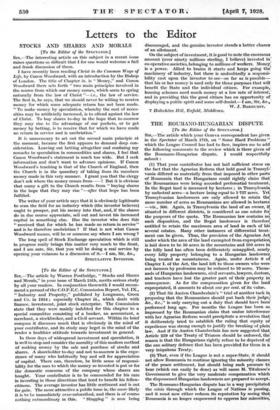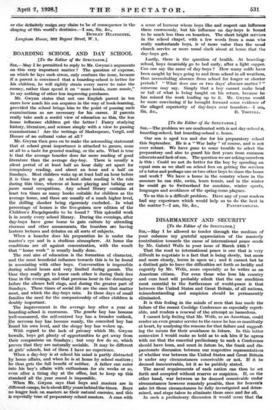THE ROUMANO-HUNGARIAN DISPUTE [To the Editor of the SPECTATOR.]
Sra,—The article which your Geneva correspondent has given in the Spectator of March 17th, on " Some Hard Problems ", which the League Council has had to face, inspires me to add the following comments to the review which is there given of the Roumano-Hungarian dispute. I would respectfully submit :
(1) That your contributor has not laid sufficient stress on the fact that the Agrarian Reform that held good in Transyl= vania, differed so materially from that imposed in other parts of Roumania that the Hungarians could rightly claim that the Roumanians were being accorded preferential treatment. In the Regat land is measured by hectares ; in Transylvania by cadastral acres—a hectare being equal to 1.737 acres. Yet Transylvanian landowners are only allowed to retain the'. same number of acres as Roumanians are allowed in hectares —viz., 500. Again, in Transylvania the land of an owner, if situated in different districts, is considered as one estate foi the purposes of the quota. The Roumanian law contains no such disposition, and the Regat landowner is therefore entitled to retain the maximum area of land in each of his several estates. Many other instances of differential treat-. ment can be given. Thus, the provision of the Agrarian Act under which the area of the land exempted from expropriation{ is laid down to be 50 acres in the mountains and 100 acres in the hilly land has often been deliberately misapplied, nearly. every hilly property belonging to a Hungarian landowner, being treated as mountainous. Again, under Article 9 of Chapter I. of the Act, the land left to those owners who were not farmers by profession may be reduced to 10 acres. Thous- ands of Hungarian landowners, civil servants, lawyers, doctors, and teachers have lost the greater part of their property in consequence. As for the compensation given for the land expropriated, it amounts to about one per cent, of its value.
(2) That Sir Austen Chamberlain's " trial of another tack in proposing that the Roumanians should put back their judge; &c., &c.," is only carrying out a duty that should have been performed long ago. For months the League has been so. impressed by the Roumanian claim that undue interference with her Agrarian Reform would precipitate a revolution that' it deliberately tried to establish the ruling that equity o4 expedience was strong enough to justify the breaking of plain: law. And if Sir Austen Chamberlain has now suggested that Article 239 of the Treaty of Trianon should be enforced, the' reason is that the Hungarians rightly refuse to be deprived of the one solitary defence that has been provided for them in a very iniquitous Treaty.
(3) That, even if the League is not a super-State, it should not allow Roumania to continue ignoring the minority clauses of the peace settlement, but should bring such pressure tti bear (which can easily be done) as will cause M. Titulesco's Government to give the very moderate compensation which the dispossessed Hungarian landowners are prepared to accept.'
The Roumano-Hungarian dispute has in a way precipitated the crisis through which the League of Nations is passing, and it must now either redeem its reputation by seeing that Roumania is no longer empowered to oppress her minorities, or else definitely resign any claim to be of consequence in the shaping of this world's destinies.=I am, Sir, &c.,
DUDLEY HEATIICOTE.
Lang,harn House, 302 Regent Street, W.1.







































 Previous page
Previous page